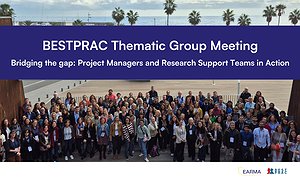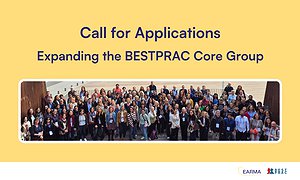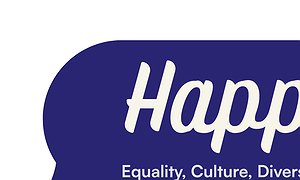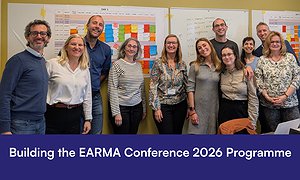Exploring AI and ethics: Key insights from the 14th ERION EARMA Thematic Group event
The 14th ERION EARMA Thematic Group event, titled "Artificial Intelligence and Ethics, the Big Wave", gathered prominent experts to address the evolving role of ethics in artificial intelligence (AI) within research management. Held at the Biomedical Research Park (PRBB) in Barcelona, this event brought together leaders from various backgrounds to discuss the ethical challenges AI presents, particularly in the context of research integrity, societal impact, and institutional responsibility. Through inspiring discussions and a collaborative environment, the event highlighted the need for ethical integration as AI technologies continue to advance. This gathering was organised by EARMA in collaboration with Joana Porcel, Data Protection Officer at the Barcelona Institute for Global Health (ISGlobal) and Co-Chair of ERION and Maruxa Martinez Campos, Digital Media and Scientific Affairs at PRBB and core member of ERION.
Setting the stage: Why AI and ethics?
The theme of AI and ethics was inspired by the immediate and far-reaching impact AI technologies are having on research practices and society. Dorian Karatzas, former Head of the European Commission's Ethics and Research Integrity Sector, highlighted the event’s focus: "While discussions around AI ethics are widespread, practical experience remains limited. The goal of this workshop is to understand better the needs at both institutional and individual researcher levels."
The impact of EU guidelines on research practices
As AI legislation advances, particularly with the EU’s Trustworthy AI Guidelines and the AI Act, the implications for research practices become more significant. ERION co-chairs Joana Porcel and Susan Hommerson pointed out the potential need for adaptation, comparing the emerging ethical landscape to the transformative impact of GDPR. Karatzas stressed a "pyramid approach" to risk in AI research, which influences the design and implementation of research protocols. To facilitate compliance, he highlighted the importance of training, expertise availability, and a perspective that views ethical guidelines as innovation enablers. Even more importantly, research institutions must demonstrate moral leadership and take the lead in efforts to ensure applicability.
Ethics-by-design: A practical approach for AI in research
A central concept explored was "ethics-by-design," which integrates ethical considerations with research processes from the outset. According to Karatzas, ethics-by-design should not only involve integration but also action. "Research managers play a key role in answering the ‘how’ and ‘who’ of ethical implementation," he noted, underlining the need for practical support mechanisms. Porcel and Hommerson echoed this, highlighting the value of research managers in helping researchers apply these principles effectively.
Collaborative efforts with PRBB
ERION’s collaboration with the PRBB Good Practice group has been instrumental in enriching discussions around AI ethics. This partnership has provided valuable insights into ethical practices and has fostered a productive exchange of knowledge within the AI ethics domain.
Afternoon closed session: Focused discussions on ethical AI
The closed session in the afternoon provided a platform for institutions and researchers to explore the practicalities of implementing ethical AI. The session offered tools for addressing ethical challenges specific to diverse research environments, allowing participants to adapt the insights gained to their unique contexts.
Embracing diverse perspectives on AI ethics
With contributions from legal, bioethical, and philosophical experts, the event successfully accommodated a variety of perspectives on AI ethics. In particular, Karatzas expressed satisfaction with the engagement of young researchers in the morning session.
ERION's commitment to ethical AI in Europe
As the EU continues to accentuate lawful and ethical AI, ERION’s role in supporting the implementation of these principles across European research institutions remains crucial. Porcel and Hommerson highlighted ERION’s capacity to disseminate practical guidance, while Karatzas suggested establishing a feedback process to better understand the challenges faced by research managers, drawing comparisons to the BESTPRAC initiative.
Future directions for ERION
Looking ahead, ERION plans to address other critical issues such as research security, which intersects with academic freedom, research integrity and ethics. While AI and ethics will remain a priority, future ERION meetings may also explore training opportunities as new EU guidance on AI ethics becomes available.
The value of joining ERION
For those new to ERION, the network offers a unique platform for professionals dedicated to ethics and integrity in research. As AI continues to reshape research practices, joining ERION provides access to resources, collaborative opportunities, and the shared expertise necessary to navigate these evolving challenges. The 14th ERION event highlighted the importance of preparing research managers and institutions to meet the ethical demands posed by AI, equipping them with insights and tools to foster responsible research and innovation across Europe.

 All news
All news



